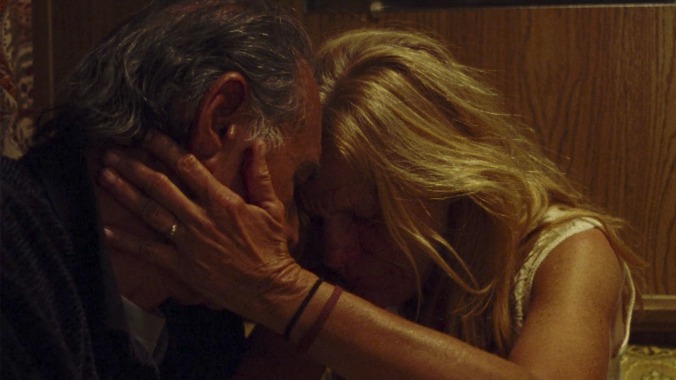A Love Song explores new romance between old acquaintances
Dale Dickey and Wes Studi aren't the romantic leads Hollywood thinks you want, but they might be the ones you need

A Love Song opens with images of small, colorful flowers breaking their way out of hard, dried, cracked earth. It’s an obvious metaphor: there’s beauty under weathered facades, like the face of Faye (Dale Dickey), a lone woman living in a camper against the backdrop of what looks like the Paramount Pictures mountain. Faye catches crawdads in the lake, surviving on them and coffee. She identifies birdcalls. She listens to bluegrass on a crackly, analog radio. She fixes her own binoculars. And she waits. Somebody’s going to meet her here, maybe. She won’t move until he does, but she has no idea when that might be.
For a while, writer-director Max Walker-Silverman revels in the minimalism of her routine. It’s a simple life, interrupted occasionally by oddballs from other campsites, including the young girl leading four cowboy-hatted men to dig up her grandfather because his burial spot no longer boasts a scenic view. If Walker-Silverman wanted this to be his Nomadland, a scenic look at the harshness and beauty of life without walls, he could probably succeed in that direction—but he has something else in mind, as the title suggests.
Eventually, her expected guest shows up—shortly before the announcement arrives indicating he’s en route. It’s Lito (Wes Studi) and his big, friendly black dog. He and Faye barely recognize one another after decades of absence, childhood friends who are now both widowed. So what comes next?
Needless to say, Dickey and Studi are a few decades older and covered with a few more wrinkles than the young and flawless objets d’amour of so many Hollywood love stories. Time brings a degree of gravitas by default, yet both play their initial interactions like charmingly awkward teens, dancing around the real subject matter at hand with small talk. They play guitar. They fill ice cream cones using a pocket knife. Slowly, the years and the layers pull back, as they, and we, see the ageless souls beneath the worn visages.
Walker-Silverman himself is considerably younger than his stars, but was inspired by classic love songs that referred to older loves. However, he doesn’t make the mistake of putting older love stories on a pedestal, either; for Faye and Lito, their courtship can be as awkward as for their younger counterparts, with as many potential rewards. Neither views this as potentially their last rodeo, though we know it could be. Then again, nobody knows how long they have, and the world is changing. A throwaway line about how the lake has been slowly drying up over the years both signifies the possible doom of climate change, and the inevitable “drying up” of our lives as we get further into them.
It’s a minor disappointment to discover there’s a 14-year gap between Dickey and Studi’s actual ages, since Faye and Lito are presumably close to the same age. A Love Song certainly seems to upend Hollywood romance cliches, but seems to reinforce one about gender-based age gaps in casting. And yet their pairing works, at least in small part because the elder Studi has had a career of playing action heroes and villains in great physical shape, and the younger Dickey one of hard-living characters who have been beaten down by the world.
Studi has also made such a career playing variations of “The Stoic Indian” that it’s a delight to see him cast for what he can play instead of who he is. He’s probably one of the last actors who comes to mind to play awkward, but he does so skillfully. Likewise, the dentally challenged Dickey is rarely called upon to play beauty, but she lets you see it. Most working actors, of course, are more complex than their usual types, but it’s a joy to see these two veterans actually get to show it.
Alfonso Herrera Salcedo’s cinematography feels like the third star of the film—anyone can point a camera at two great character actors with memorable faces, but Salcedo’s compositions and eye on the natural surroundings make whimsical art scenes with bare essentials. The campsite does a lot of the art direction heavy-lifting, but due credit to production designer Juliana Barreto Barreto for that camper interior, with its off-yellow tones and wood panels looking like the visually manifested odor of secondhand smoke and the ’80s.
Studi won an honorary Oscar in 2019; it’s suitably ironic that only now he gets the kind of role that could score him a nomination for real. Dickey, who has an Independent Spirit award for Winter’s Bone, ought to have a real shot at leading nominations this time—in some scenes, she remains so still that only her eyes do the work, telling a silent story of years past. On the surface, there’s little more simple than a story of two people trying to make a connection. On an emotional level, however, few things are more complicated. Like life, A Love Song offers no easy conclusions—just simple realizations. In expert hands, that’s enough.